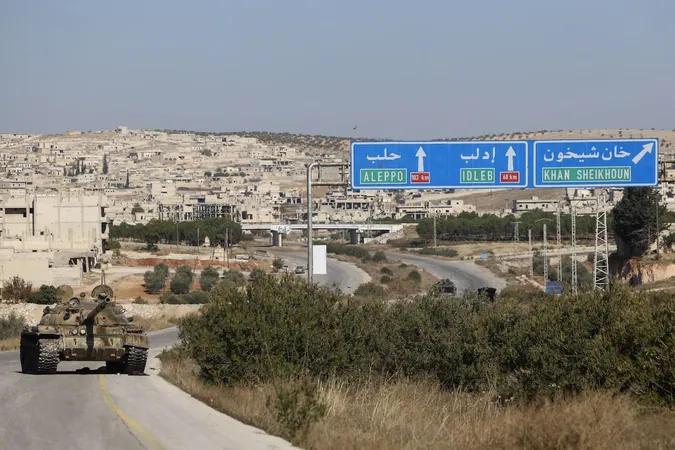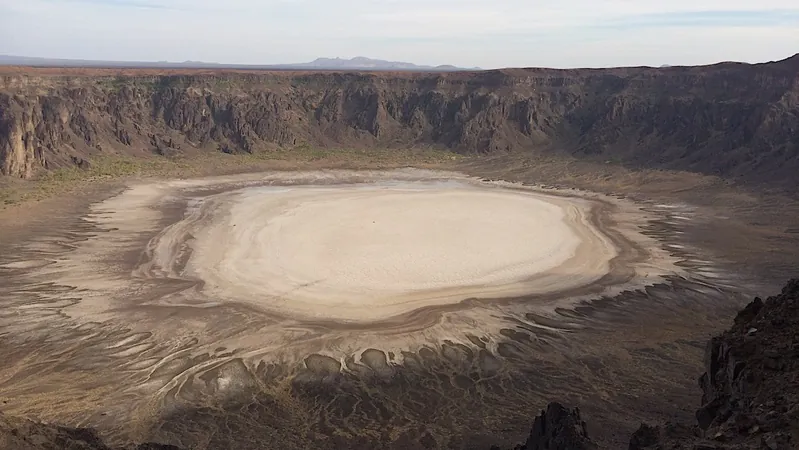
Iraqi Militias Mobilize into Syria Amid Escalating Conflict: A Game-Changer for Assad?
2024-12-02
Author: Jacques
Introduction
In a dramatic turn of events, hundreds of Iranian-backed Iraqi militias have crossed into Syria, bolstering President Bashar al-Assad’s forces in their struggle against escalating rebel aggression. According to sources from both Syrian and Iraqi intelligence, at least 300 fighters from the Badr and Nujabaa groups made the crossing late Sunday night, opting for a less-traveled dirt road to bypass official border checkpoints.
Reinforcements Critical for Assad
A high-ranking Syrian military official stated that these reinforcements are critical for defending key Shiite shrines and supporting troops on the front lines in the north. To evade detection and potential airstrikes, the fighters have reportedly crossed in small groups. This operation underscores the continuous commitment of Iranian forces to preserve Assad's power amidst a civil war that reignited with unexpected rebel gains in Aleppo last week.
Iran's Position and Responses
While the head of Iraq’s Popular Mobilization Forces denied any group under their command had crossed into Syria, the alignment of Iranian militia groups has proven vital for the Assad regime. Iranian Foreign Minister Abbas Araqchi expressed confidence in Syria's military capabilities to counter the remaining rebels, affirming that "resistance groups will help," with Iran ready to offer any necessary support.
Recent Developments in the Conflict
The conflict in Syria, which began with protests against Assad's rule in 2011, witnessed significant developments last week when rebels launched a well-coordinated offensive, dealing Assad his most significant setback in years. This renewed aggression has rekindled fears of an expanded conflict, especially as Russian and Syrian air forces ramp up their operations against rebel positions following this shift in power dynamics.
Regional Implications and International Responses
As the situation escalates, concerns arise about the broader regional implications, particularly with ongoing tensions in Gaza and Lebanon. The United States and United Arab Emirates are reportedly exploring options to draw Assad away from Iranian influence, potentially lifting sanctions if he curtails the flow of weapons to Hezbollah in Lebanon.
Shifting Territorial Control
The rebel forces infiltrating Aleppo include factions supported by Turkey as well as the Islamist group Hayat Tahrir al-Sham, which has ties to al-Qaeda. Turkish foreign minister Hakan Fidan emphasized that recent rebel movements are not solely a product of foreign interference, urging a compromise from the opposition.
Ongoing Clashes and Regional Stability Concerns
Additionally, reports indicate that a shift of territorial control is unfolding, with Turkey-backed Syrian National Army forces seizing the town of Tel Rifaat from Kurdish YPG militants. As developments progress, Kurdish forces are reportedly surrendering parts of Aleppo, indicating changing dynamics in the conflict.
Conclusion
With strategic discussions unfolding between Turkey and Iran, and tensions heightening with Israel’s military pledging to counter any Iranian weapon transfers, the region stands at a critical juncture. The ongoing clashes not only threaten the fragile stability of Syria but also pose a risk of repercussions for surrounding nations already on edge due to multiple geopolitical conflicts. As eyes turn toward the next moves in this complex theater of war, one question looms large: will this fresh influx of militia fighters tip the balance of power in Assad's favor, or will it ignite a new cycle of violence that ripples across the region? Only time will tell as the Syrian Civil War continues to evolve in its 13th year, with millions of lives hanging in the balance.









 Brasil (PT)
Brasil (PT)
 Canada (EN)
Canada (EN)
 Chile (ES)
Chile (ES)
 España (ES)
España (ES)
 France (FR)
France (FR)
 Hong Kong (EN)
Hong Kong (EN)
 Italia (IT)
Italia (IT)
 日本 (JA)
日本 (JA)
 Magyarország (HU)
Magyarország (HU)
 Norge (NO)
Norge (NO)
 Polska (PL)
Polska (PL)
 Schweiz (DE)
Schweiz (DE)
 Singapore (EN)
Singapore (EN)
 Sverige (SV)
Sverige (SV)
 Suomi (FI)
Suomi (FI)
 Türkiye (TR)
Türkiye (TR)